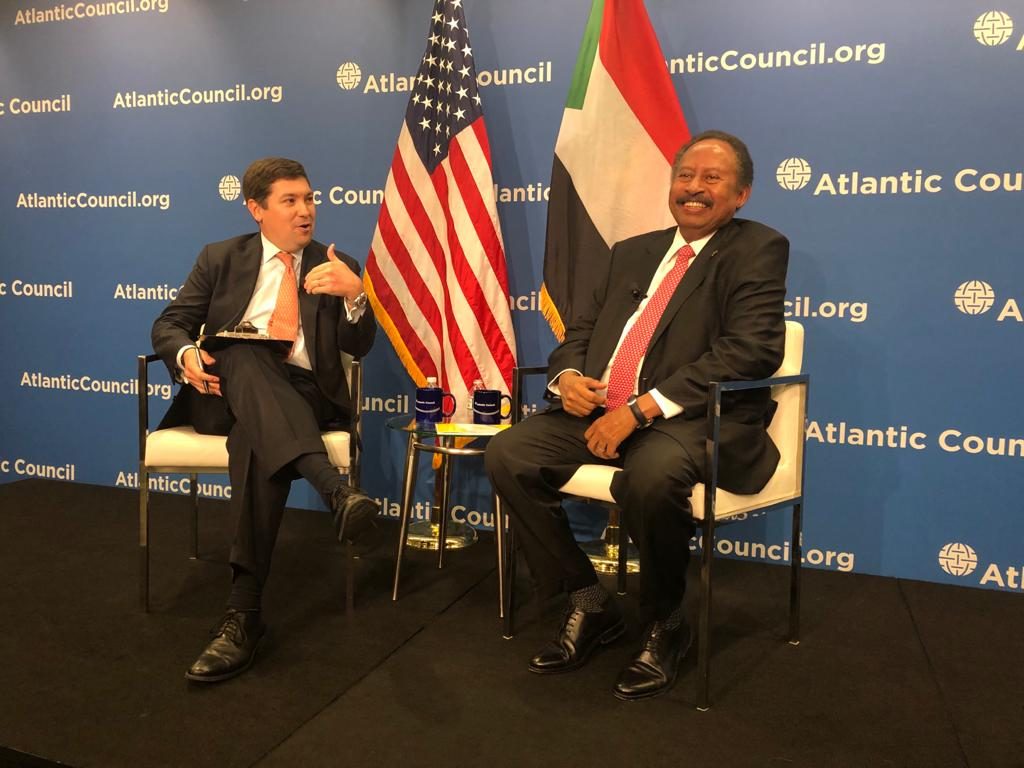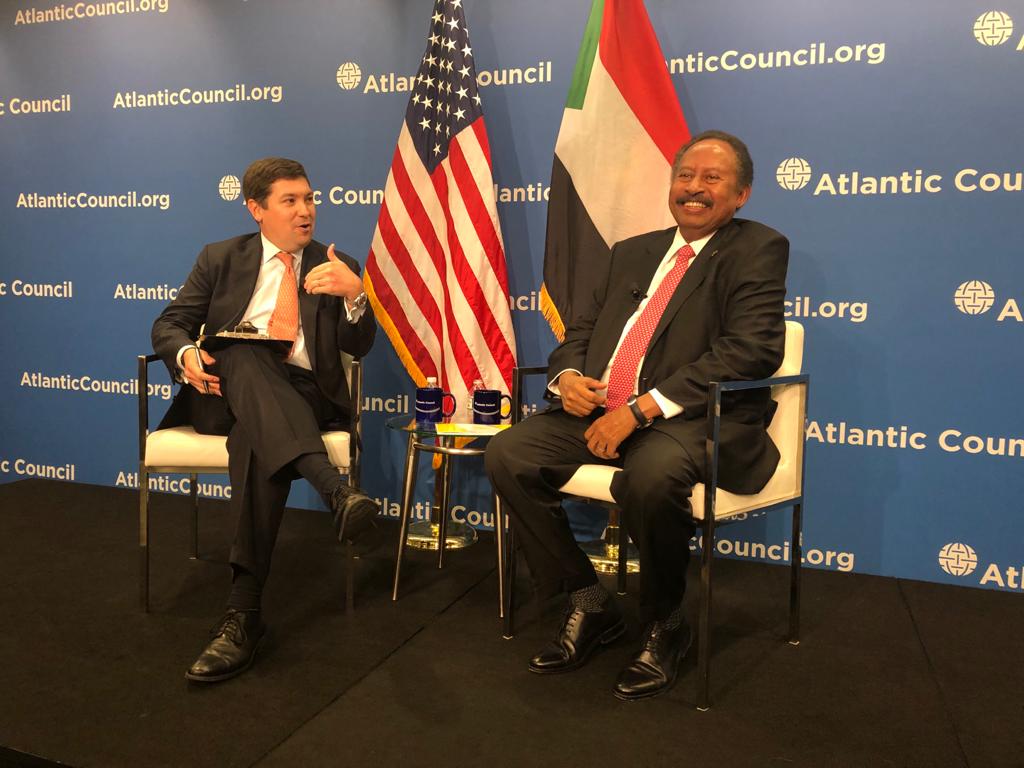No clear road ahead in Sudan’s bid to be removed from US terrorist list

Removing SST key for the economy
Sudan’s inclusion on the U.S. list of countries deemed sponsors of terrorism make it ineligible for debt relief and financing from lenders like the International Monetary Fund and World Bank, cutting off a crucial source of finance. The new government is desperate to clear bills accrued by the former regime, estimated at around $60 billion in foreign debt, an amount that can only be cleared once U.S. and U.N. sanctions are lifted. Sudan’s debt is coupled with crippling inflation, one of the highest globally at over 60%, according to the Sudan government. Last month, Prime Minister Abdalla Hamdok told Reuters the country needs a further $8 billion in foreign aid over the next two years to avert economic collapse.
Not only must Sudan have the U.S. sanctions lifted to access foreign loans and debt relief at the state level, but it is also crucial for private investment. With the sanctions in place, investors fear severe fiscal reprisals for any business interaction with the country –no matter how irreproachable the transactions may be. Potential investor’s fears are justified. In 2014, France’s BNP Paribas Bank pleaded guilty for violating U.S. sanctions involving banned transactions with Sudan, Iran and Cuba paying a record $8.9 billion in damages. “No serious investor will take the gamble and invest in a country that is isolated from the international payment system,” says Sudanese economy professor Hamid E. Ali at the American University in Cairo. “It has eroded investor confidence. So many good businesses have been shattered and industries reduced to scraps throughout the years [due to the sanctions].”
Crucial foreign imports supporting the manufacturing and agriculture sector cannot be imported and delays commercial development says Khartoum-based businessman Said Naser. “We are not even able to transfer money to pay foreign companies directly,” Naser added, “it is still too challenging for foreign investors to invest here in Sudan.”
At the same time, says Jonas Horner, a Senior Analyst for the foreign-policy think tank, the International Crisis Group, Sudan should not consider removal from the SST list as the only solution to resolving the country’s economic woes. “Both in government and on the streets, Sudanese see the lifting of the SST designation as an economic panacea,” Horner told Ayin. While the Crisis Group are proponents to lifting the U.S. sanctions, he says, they believe the Sudan government must also undertake several domestic measures to boost the failing economy. “Instructively, when US sanctions were largely removed in 2017, there was virtually none of the economic bounce that Sudanese had eagerly anticipated.”
The U.S. State Department added Sudan to the SST list in 1993, saying Khartoum harboured international terrorists, including Osama bin Laden. “Sudan harbours elements of the most violent terrorist organizations in the world: Jihad, the armed Islamic group, Hamas, Abu Nidal, Palestinian Islamic Jihad, Hizbollah, and the Islamic Group are all present in terrorist training camps in Sudan,” said Senator John Ashcroft during a Senate Foreign Relations Committee hearing in 1997. “And Sudan is not simply a favourite vacation spot for terrorists, the Sudanese government is an active supporter of these terrorist activities.”

To lift SST or not to lift
But Sudan has come a long way from its days of hosting the likes of Osama bin Laden. The head of the U.N.’s Office of Counter-terrorism, Dr Raffi Gregorian, commended the new Sudanese government’s “expressions of commitment” to counter-terrorism last week, saying authorities invited the UN team to visit showing “consistent and strong expressions of commitment.”
Proving to the U.S. the Sudanese transitional government has truly reformed, both politically and ideologically, is based on meeting seven conditionalities. According to the prime minister, Sudan has already met six of these conditions: addressing peace, ensuring freedom of religion, change to its relationship with North Korea, allowing humanitarian relief access to conflict zones, and cooperation in fighting terrorism. The remaining seventh condition is an agreement on the compensation for victims of terrorist operations conducted in 1998 against U.S. embassies in Nairobi, Kenya and Dar es Salam, Tanzania. U.S. courts also hold Sudan partially responsible for the suicide attack on the USS Cole in Aden harbour in 2000, in which 17 US sailors lost their lives.
Cameron Hudson, Senior Fellow at the U.S.-based foreign policy think-tank the Atlantic Council and long-time former Chief of Staff for the Office of the US Special Envoy to Sudan, believes reparations is not the only factor that stands in the way. “The certification process [to remove the sanctions] is an intelligence process that takes time,” he told Ayin. “I am more optimistic than before that it can and will be lifted but you cannot say it will happen in a month. There are not many countries that have been delisted so there is no easy template to carry out this process.”
Crisis Group Senior Analyst Horner concurs. The U.S. government still harbours several concerns, he said, including the unclear power balance between the civilian wing of Sudan’s transitional government and the security forces and which of these two actors will benefit the most from removing the sanctions. “The transitional character of the current administration and the disproportionate power of the security forces vis-a-vis the civilians in government makes removal a risk for the U.S.”
U.S. officials have said privately the relationship between the civilian authorities and the military forces, which heads up the sovereign council, is also an area of concern. Hamdok and the civilian government does not have full control over the military or intelligence wings, Hudson said, and American officials are jittery over people like the leader of the paramilitary Rapid Support Forces, Mohamed Hamdan Daglo (aka “Himmedti”).
“He [Himmedti] has unchecked authority, an independent source of revenue and a private army of around 60 – 80,000 strong loyal to him,” Hudson said. “It’s one thing for Hamdok to come to Washington, but it’s another thing if he cannot credibly back up promises.” Hamdok must demonstrate he has some influence over the security forces to build confidence within the U.S. administration. One key area where this can be done, Hudson added, is reform in the 2020 budget –ensuring that the bulk of expenditure is not directed towards the security sector as it has been in the past.
While the U.S. government may acknowledge that Sudan’s transitional government has reformed, there are legitimate fears that some citizenry has not. Sudan still harbours local elements that may, if not openly, continue to support terrorism. Before the transitional government came to power in 2014, Islamist Sheikhs such as Mohammed Ali El-Jizuli openly supported ISIS in a speech [link] made in Khartoum telling followers a year later in a recorded speech telling followers that “any American embassy is a legitimate target” in solidarity with ISIS. Going forward, this same leader was invited by the Transitional Military Council in mid-April, before the transitional government was formed, to make a presentation.
Progress in identifying organisations suspected of sponsoring terrorism and controlling their money circles is one of the most sensitive areas that need to be addressed for the U.S. lifts sanctions, according to Sudan University International Relations Professor Mohamed Ahmed Shaqila. Lifting the sanctions in its entirety, Professor Shaqila told Ayin, “Will not only benefit investors but will also benefit those suspected terrorist groups in the country as well.”
Despite the potential risks of delisting Sudan sanctions, the perils of keeping sanctions could prove far worse for the west. “If Sudan is allowed to backslide, it will be a failed state, and you can imagine what will happen,” Prime Minister Hamdok said in an interview with The Independent. “If [Sudan] fails, Isis in Syria will be small fry. We have seven countries with huge land around us. You are not going to have one caliphate – there will be seven of them,” he added. While Washington may prefer to wait a year or two to assess whether Sudan’s transition is genuine, Hudson said, they also realise that by ignoring Sudan, the country may fail. “I believe the [U.S.] government sees the strategic value in getting Sudan right, Sudan is at a very critical crossroads in this entire region. Anything that we do that is not in support of him [Hamdok] – really only benefits people who oppose change.”


